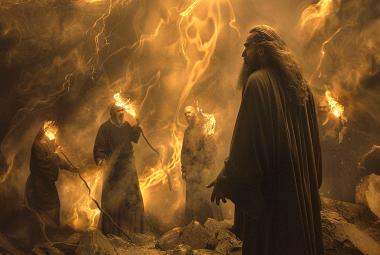DATELINE: June 5, 1967- Israel is surrounded by enemies who want nothing less than her utter extinction. The Soviet-equipped Egyptian Army has amassed a thousand tanks on the nation’s southern border. Syrian heavy guns are shelling her from the north. To the east, Jordan and Iraq are moving mechanized brigades and fighter squadrons into position to attack. Israeli military knew this would happen sooner or later and had mapped out what their response would be. Some of those preparations were planned down to the minute details several years in advance. They knew there was no room for error, defeat was not an option. It was either total victory or total annihilation.1
Across Israel all the military and civilians understood the mission. Everyone understood that any deviation from the mission meant disaster at best, or the death of the nation of Israel. Soldiers who saw their friends and comrades fall in battle could not stop to render aid because even the slightest hesitation would throw off the timing and execution of their mission and cause it to fail. That primary failure would set up a chain of events which would then cause the overall mission to fail, and the quick death of their nation at the hands of their enemies. Everyone was focused. No one allowed themselves to be distracted by the overwhelming odds they faced, both in equipment and in troop numbers. Everyone had eyes only on accomplishing the mission, and survival.
As Christians, we all have been given a mission to accomplish. Whenever I hear someone say that, my mind immediately goes to what is referred to as The Great Commission: “Go ye into all the world…”2 While that is the general mission that we all have, what I am talking about is our unique, personal mission. For each of us, it is something different than what our buddy has been given to do, but it’s no less and no more important in the eyes of God. The problem is that most people who call themselves “Christian” don’t even know they have a responsibility to do something, let alone a real mission to accomplish.
In reality every event in our life, every trial, every disappointment, every heartache, every gut-wrenching agony of the soul is training for the mission. Every soldier preparing for battle has to constantly train and condition their physical body, so that, in the heat of the battle, the training kicks in and causes the body to do what it has repeatedly trained to do. So too, serious Christians must train and condition themselves to be able to accomplish their personal mission without hesitation.
But if Christians are not even aware they have a mission, how can they train for it? How can they make sense out of the series of events in their life that take them to the “edge” and back? If they know nothing about their mission, how can they recognize the hand of God directing their lives, providing them with the conditioning they need to get in shape? How can they dig in and train for the task ahead? How can they expect to do anything but fail?
Here at Koinonia Institute our Mission is to Train and Equip the serious Christian for ministry in today’s world. In 2015, when the KI Academic Review committee was formed to perform a thorough review of ‘Everything KI,’ I started asking people if they knew what our Mission was. After thinking for a bit, most people could tell me they thought we had one, but no one seemed to know what it was…maybe, “something about strategic trends.” Well as you can see, when I pulled our mission statement out of the dusty drawer where it had been tossed, it says nothing about strategic trends. Actually, the original version said, “train and equip the serious Christian to sojourn in today’s world.” But no one needs to train and learn how to “hang out” for a while before moving on. We all seem to be able to do that without any training. You don’t even need to be a “serious Christian” to hang out for a while. In fact, the Christians who really are serious are more inclined to get busy making disciples. So, right from the start, we had lost focus in at least two different directions. No wonder we were not accomplishing what God put us here to do.
As our committee made our review, we began to pit every aspect of our program against our Mission Statement. Everything that did not align with our mission was tossed to the curb. If something was salvageable by making changes, we did that. In areas where nothing was salvageable, we started from scratch.
Then began the effort to build what had always been at the heart of our mission. We discovered that our old program had largely barred the Holy Spirit from the classroom. Recognizing that the disciples didn’t understand their Mission until the day of Pentecost, we opened the door to our classrooms and brought Him front and center into the classroom. What we may not be able to supply in the classroom, the Holy Spirit brings to the experience in our KWL Bronze and Silver level Issachar and Koinonos classrooms. (KWL stands for 3 questions the student asks themselves, K asks, “What do I already Know about this subject?” W asks, “What do I Want to learn about this subject?”
L asks, “What have I Learned having studied this subject?”) Each of these new classes focuses on some kind of ministry or examples of people serving God in some capacity to accomplish their personal Mission. Combined with the requirements of a Ministry Journal at each level, these serve to help focus student’s attention on discovering the Ministry for which God is preparing them.
For months we have been working to define the Issachar and Koinonos paths through the Gold Level. At this level, the serious Christians should be quite sure of their individual calling. They should be already working to map out a plan for getting started and begin to step out in faith to do what the Lord is showing them. “And of the sons of Issachar, which were men that had understanding of the times, to know what Israel ought to do.”3 As a serious Christian, have you spent the needed quality and quantity of time with the Holy Spirit, so you know what your mission is? Have you begun to work on a plan to actually get started?
Discovering your calling, recognizing that call as a divinely appointed Mission, going to the Lord for clarification to gain a better understanding of it, and doing whatever research is needed to allow you to map out a plan to get started is the essence of Issachar. That’s where you take what you know and evaluate it in light of what God continues to reveal to you.
As Issachar is to evaluation and planning, so Koinonos is gathering up the courage to put everything you know to the test and step out of the safety of the boat4 to begin experiencing what God is showing you. This is where you roll up your sleeves and step out in faith, carrying out your plans. This is where you get out of the pew, off the couch, to truly follow God at last. You actually begin to put one foot in front of the other, and tackle the Mission He has given you.
You developed the relationship you needed to hear Him giving you your personal Mission, and firm direction to your path. Now, you can be sure that He will continue to lead you along the way. It may feel a bit like taking a leap into the abyss, but if you are following God’s leading that feeling will soon go away. If you continue to feel like you are falling into the abyss, don’t waste any time before you seek God’s advice for a course correction!
As you launch out into the deeper waters, continue to evaluate how things are going. Be sure to update your Ministry Journal often. For your first project, open up a Practicum for your project and enter your observations (about both the good and bad things) and determine what changes need to be made for the next time out. Then do it again incorporating the insights you gained from the first run.
In Judges 1:25 through 2:5, we discover that there were many areas of the promised land where the Israelites failed to accomplish all of their mission. Those failures had an immediate effect on the amount of time they lived in their land. The people began to worship the gods of the pagans they had not cast out as God told them to do. For 3,500 years or so, they have been paying the price for failing to complete the Mission and failing to accomplish God’s objective. As a people, they repeatedly failed in the mission they had been given, and any course corrections only lasted for a relatively short time. In many ways, today’s Christians are not so different than they were, but we have no excuse because we have the Biblical record to look at.
DATELINE: June 10, 1967- The Arab armies have been routed; their air forces totally destroyed. Israel’s citizen-soldiers have seized the Gaza Strip and the Sinai Peninsula from Egypt, the Golan Heights from Syria, East Jerusalem and the West Bank from Jordan. Moshe Dayan has entered the Lion’s Gate of the Old City of Jerusalem to stand with the paratroopers who have liberated Judaism’s holiest site—the Western Wall.5
They stayed totally focused on the Mission right up until the United Nations stepped in to “stop the hostilities.” The Israelis not only were still there as a nation but had gained territory that added to their ability to protect their citizens. It was nothing short of a miracle as once again God had fought for them and blessed their best efforts; not because they ‘deserved’ His favor, but because He promised to bring them back into their land and make them a nation once again. In short, the Israelis were ‘doing the will of God’ in fighting to defend their right to exist as a nation.
In the Letters to the Seven Churches in the Book of Revelation, we see what happens when the serious Christians, represented by each of those churches, lost their focus and sense of mission. Out of the seven churches, only two of them had no indictments against them. In every case, a promise was made to those in each church who refocused on the mission and stayed on track to the end. Yet when you look for those churches today, they don’t exist. There are many theories as to what happened to them. Did they ultimately accomplish the mission they were given, cave in to pressure from the culture, or were they destroyed by the wars fought over the centuries?
As you have been taking our courses – taking the quizzes in some classes, writing self-assessments in others, and writing your Ministry Journals, we pray that you have been taking a serious look at what God is calling you to do for Him. As you contemplate your Gold Issachar and Koinonos projects, you have to have a good grip on what God’s will is for you. Your Issachar and Koinonos projects give you the opportunity to step out of the boat and keep your eyes focused on the Savior and His will for you (your Mission) and get started. If you don’t have that nailed down yet, now is the time to make that your priority; your future depends on knowing and doing the will of God.





